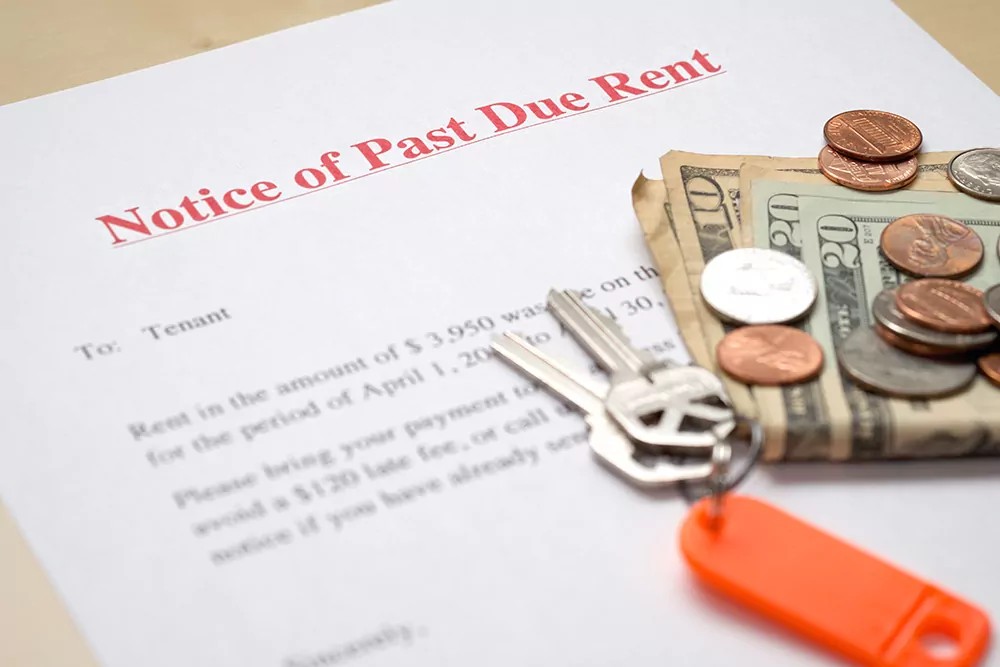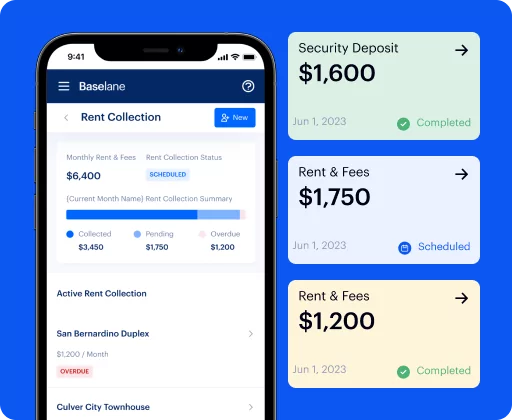One of the most common disputes between landlords and tenants is late rent payments. Regardless of the reason for overdue rent, it’s vital to enforce the terms of rent collection in the lease agreement tenants signed by sending a late rent notice.
In this Baselane article, we’ll review what a late rent notice is, how it works, and why it’s such a critical document for rental property owners.
1. What is a Late Rent Notice?
A late rent notice is a written letter from a landlord to notify their tenants that their rent is past due. While this isn’t an official eviction notice, the letter’s purpose is to request the tenant pay rent before starting the eviction process.
Sending a late rent notice also allows the landlord to keep a record of communication if the tenant continues to default on rent payments.
Sometimes it can be a genuine mistake. After all, everyone can forget now and then, so the late rent notice might just be a necessary kick for your tenants to avoid paying rent late again.
2. How to Write a Late Rent Notice
Ideally, the first step to drafting a late rent notice is to check your rental agreement and local laws. This will help the landlord understand any regulations regarding overdue rent.
For example, most states have specific rules for what is considered late rent, when to send a late rent notice, and if you can charge late fees.
In general, a late rent notice should include:
- Date of the late rent notice
- Rental address
- Tenant name(s) and contact information
- Overdue rent amount
- Due date when rent must be paid
- Grace period (if any)
- Late fees if the rent is not paid in full by the grace period
- Payment options
- What will happen if rent is not paid in full and for future overdue payments
- Landlord(s) name and contact information
- Landlord(s) signature
There are plenty of free templates online that you can use to simplify the process. Simply access this free Late Rent Notice template and have your tenants fill out the form. Sometimes these forms are also called a Notice to Pay Rent, Failure to Pay Rent Notice, Demand for Payment of Rent, and Notice to Cure.
3. How to Send a Late Rent Notice
When you should send a late rent notice will depend on your state, local laws, and the conditions of the lease agreement.
Most states allow landlords to send a notice as soon as rent is past due. More than a third of states require a grace period of 3 to 5 days before an official eviction notice can be served. The District of Columbia has the most generous grace period of 30 days.
The traditional way to deliver a late rent notice is in person or by certified mail. However, technology has made sending documents easier and more convenient. Some landlords use email to send a late rent notice, but most are making the pivot to property management software, like Baselane, that allows tenants to pay rent online.
Online rent collection simplifies the rent payment process and increases the likelihood of tenants paying on time. You can also automate reminders for late payments to help tenants stay on track.
No matter which method you choose, it’s recommended to keep a copy of the notice in the tenant file, including proof that it was delivered.
A late rent notice should be used the first time a tenant misses a rent payment. In many states, if a tenant is late with rent a second or third time within a specified number of months, they can face immediate eviction the moment rent is overdue.
Typically, you will want to serve an eviction notice, also called a Pay or Quit Notice, to begin the formal eviction process.
4. What is a Reasonable Late Fee?
State laws also regulate the terms for charging fees for late rent payments. Some states, like Texas and New York, only specify that landlords must charge a “reasonable amount” for late rent fees, while other states are more specific.
For example, property owners in Florida can charge a late fee of $20 or 20% of the monthly rent, whichever is greater. In Virginia, the law states that landlords can charge 10% of the monthly rent amount or the amount of past due rent that is owed, whichever amount is less. On average, late rent fees tend to fall between 5% and 10% of the monthly rent.
Beyond adhering to state regulations, the key to calculating late fees is to make sure you are strategic. Sometimes when a landlord expects a sizeable late fee, it can backfire.
Some tenants won’t have the financial means to pay a high late fee, along with their overdue rent. Pricey late fees can also leave a bad taste in the tenant’s mouth, in which they don’t renew the lease. As a result, you’re faced with an unexpected vacancy expense.
It may be tempting for some landlords to accept partial rent payments to keep the peace with tenants while managing property expenses. However, it is generally not good practice to accept partial payments for rent because it can send the wrong signal to tenants that rent due dates are negotiable.
If partial payments are accepted, this may also impact the eviction process. In some jurisdictions, you have to start the process to evict a tenant all over again if you accept a partial payment for overdue rent.
5. How to Avoid Late Rent Payments
We know conversations surrounding late rent can sometimes be unpleasant. The best way to handle late rent payments is to put steps in place to avoid them in the first place.
Remember to always include the terms for collecting rent and late rent payments, the grace period, and your state’s rental laws in the leasing agreement.
Thoroughly screening tenants before signing a lease, including contacting their previous landlords and verifying employment, can help improve your chances of getting on-time rent payments from tenants you can trust.
Another way to help prevent overdue payments is online rent collection. Automatic rent payments and reminders document payment information, so you don’t have to worry about losing records.
FAQs
Generally, rent is considered late one day following its due date. However, some states will make exceptions for any delay in the payment delivery, such as late mail delivery or holiday. It will usually grant tenants a grace period of three to five days. If this is the case in your state, the terms of late rent should be clearly outlined in the lease agreement.
Most states allow evictions for overdue rent payments, although the eviction timeline will depend on your local laws.
Once the landlord reminds the tenant that rent is overdue, the tenant must pay the rent in full before the grace period ends.
If the tenant still hasn't paid by the due date specified in the late rent notice, the landlord can file for eviction with the local court and begin the eviction process.
Depending on state laws, it's acceptable to charge the tenant a “reasonable” late fee.
Tenants who make a habit of paying their rent late affect your cash flow, so late fees help offset any costs incurred and incentivize the tenant to pay rent on time.
If you're going to charge a late rent fee, be sure the terms are laid out in the lease.







